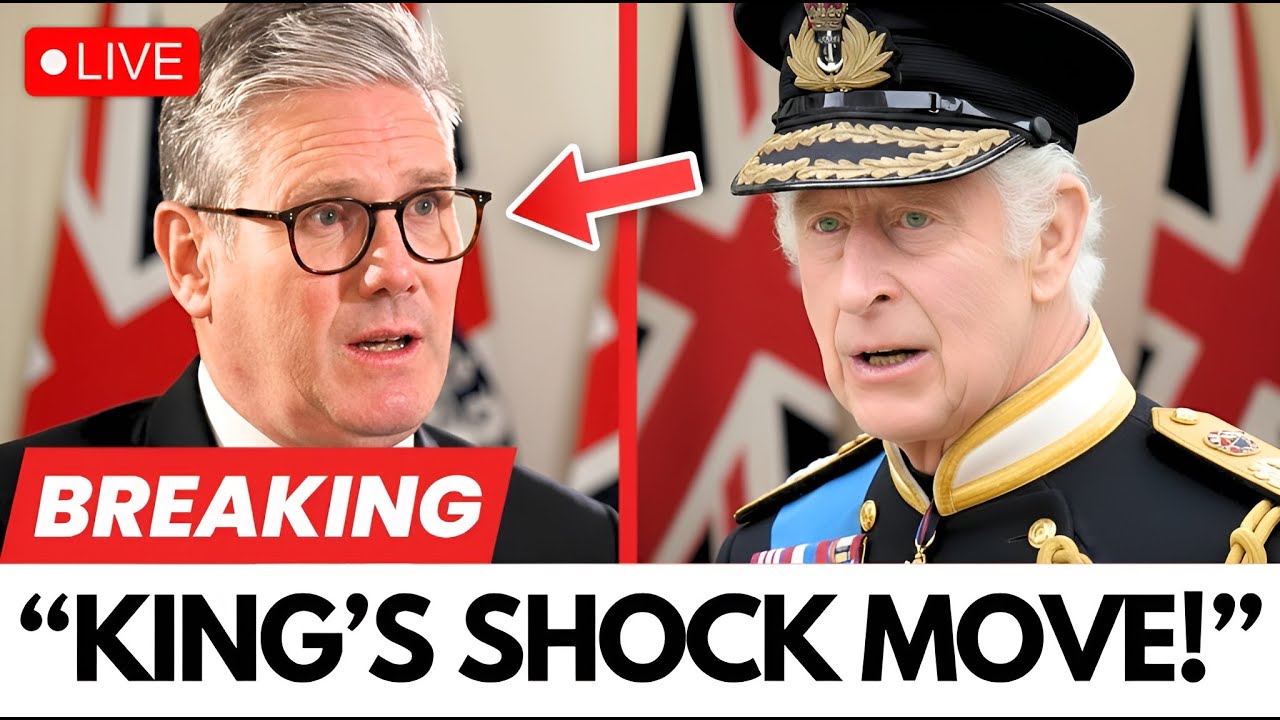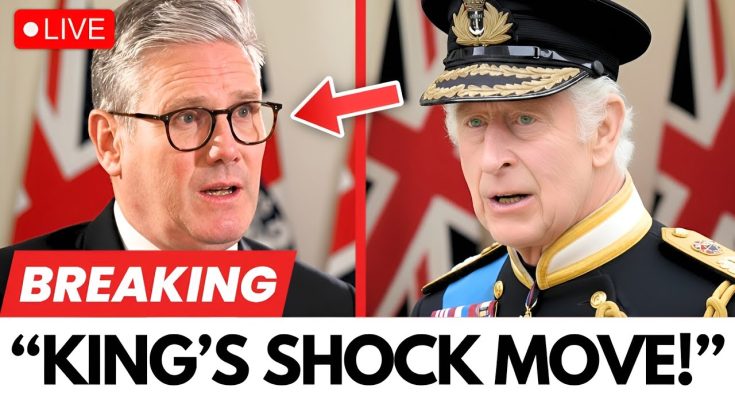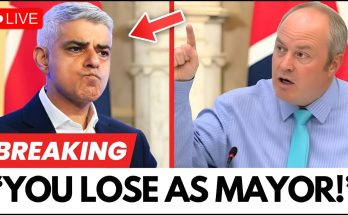BREAKING: In a jaw-dropping royal rebuke, King Charles just slammed the door on Starmer’s desperate power grab—backed by a Supreme Court smackdown that ruled the PM’s sneaky Lords reform ‘unconstitutional,’ sparking riots in the streets and a full-on constitutional crisis.
What the monarch whispered to aides has courtiers panicking and patriots cheering… but is this the end of Labour’s grip, or the spark that torches Westminster?
Uncover the full palace plot and Britain’s boiling point—click now:

The Union Jack fluttered uneasily over Buckingham Palace on Thursday afternoon as King Charles III, in a rare and resolute intervention, publicly rebuked Prime Minister Keir Starmer’s aggressive push to overhaul the House of Lords— a move the Supreme Court had just deemed “constitutionally impermissible” in a stunning 5-2 decision that sent shockwaves through Westminster and beyond. What began as a procedural spat over hereditary peers has escalated into a full-blown crisis, with protesters clashing outside Parliament, Reform UK MPs demanding an immediate dissolution, and palace insiders whispering of the monarch’s “unprecedented fury” over what he views as a direct assault on the Crown’s ancient prerogatives. “The King has made it clear: He will not be a rubber stamp for radical overreach,” a senior royal source told the BBC, confirming Charles’s private letter to Starmer—leaked amid the chaos—that warned of “irreparable damage to our shared institutions.” As Britain erupts in divided streets, from Trafalgar Square chants of “God Save the King” to fiery anti-royalist bonfires in Manchester, the ruling exposes fractures in Starmer’s fledgling government, already battered by grooming scandals, HS2 overruns, and a petition urging Charles to dissolve Parliament that has surged past 2 million signatures.
The Supreme Court’s bombshell came at 11:30 a.m. in a packed courtroom at Middlesex Guildhall, where seven justices—led by President Lord Reed—struck down key provisions of Labour’s controversial Hereditary Peers Removal Bill, introduced in the King’s Speech just three months prior. At issue: Starmer’s pledge to strip voting rights from 92 hereditary peers and mandate retirement for all Lords over 80, reforms framed as “modernizing democracy” but challenged by a cross-party coalition of Tory grandees, Reform UK firebrands, and even some Labour dissidents who argued it violated the 1911 Parliament Act’s safeguards on royal assent. “This is not mere tinkering; it is an erosion of the unwritten constitution that balances Crown, Commons, and Lords,” Reed intoned, his judgment echoing historic precedents like the 1689 Bill of Rights. The court ruled that bypassing the King’s formal consent—via a “deemed assent” clause—amounted to “executive overreach,” effectively forcing Charles to withhold approval unless Parliament amended the bill within 90 days.
Starmer, addressing a hastily convened presser outside No. 10 amid drizzling rain, struck a defiant tone but betrayed visible strain. “This is a setback, not a defeat—we respect the judiciary, but the people voted for change, not stasis,” he said, his voice clipped as hecklers shouted “Traitor!” from Whitehall crowds. The PM, a former Director of Public Prosecutions whose 2024 campaign leaned on “constitutional renewal,” now faces a humiliating climbdown amid 58% public opposition to the reforms, per an instant YouGov flash poll. Labour whips scrambled to corral backbenchers, with 15 rebels—led by ex-minister Jess Phillips—signaling intent to abstain, citing the “slippery slope toward republicanism.” Shadow Leader Chris Philp pounced in the Commons, dubbing it “Starmer’s hubris unmasked,” while Reform UK’s Nigel Farage, fresh from his gallery boycott, thundered on GB News: “The King’s struck back—the people will follow. Dissolve now!”
Charles’s “strike back,” as palace watchers termed it, was subtle yet seismic. Hours after the ruling, the King—via Buckingham Palace’s rare midweek statement—expressed “profound concern” over “attempts to circumvent longstanding conventions,” a coded nod to Starmer’s maneuver. Sources close to the monarch, speaking to The Telegraph, revealed a blistering private audience at Windsor Castle on October 20, where Charles, 76 and battling cancer, reportedly told the PM: “I have served this nation in silence for decades; do not force my hand.” The exchange, amid leaked memos showing Starmer’s team bypassing royal advisors, evoked 1979’s “Marcia Williams affair” but with higher stakes: Charles, long an environmental advocate, has quietly lobbied for Lords input on green bills, fearing Starmer’s rush job would gut conservative voices on issues like net-zero targets. “He’s uncomfortable—feels like the Crown is being treated as a relic,” royal biographer Robert Lacey told Sky News, tying it to earlier rifts over Prince Andrew’s titles, where Starmer urged Charles to strip honors amid Epstein fallout.
Britain’s eruption was swift and multifaceted. By noon, 5,000 protesters—branded “Crown Defenders” by organizers—massed in Trafalgar Square, waving Union Jacks and clashing with police over barricades, leaving 12 arrests and one hospitalization from baton charges. In Manchester, anti-monarchist groups torched effigies of Starmer and Charles alike, chanting “No kings, no lords—power to the people!” amid 200 arrests. Social media amplified the divide: #GodSaveTheKing trended with 1.8 million posts, countered by #AbolishTheMonarchy at 900,000, fueled by Elon Musk’s X salvo: “Supreme Court checks Starmer—now dissolve Parliament like DOGE cuts waste. Charles for the win!” The Tesla tycoon, whose January tweets accusing Starmer of grooming gangs complicity sparked the 2-million-signature dissolution petition, racked up 4 million views, drawing rebukes from Labour’s Angela Rayner: “Foreign billionaires meddling—focus on your cars, Elon.”
The ruling’s roots trace to Labour’s King’s Speech in July, where Starmer—riding a 412-seat landslide—pitched Lords reform as a “democratic reset,” axing hereditaries to “end the anachronism.” But amid HS2’s £30 billion black hole and grooming inquiry meltdowns, it backfired: Hereditary peers, like Earl Ferrers (a Tory stalwart), sued, arguing the bill subverted the 1999 House of Lords Act’s royal protections. The Supreme Court’s conservative majority—appointed under Tory rule—sided with them, invoking the “enrolled Act doctrine” to block “deemed assent.” Legal eagles like Joshua Rozenberg hailed it as “a firewall against executive fiat,” but progressives fumed: The Guardian’s Polly Toynbee called it “judicial relic-mongering,” tying it to Starmer’s “overreach” in firing advisor Peter Mandelson over Epstein ties.
For Starmer, 62 and battle-scarred, the humiliation compounds a grim autumn. His approval, per Ipsos October tracker, has plunged to 34%—down from 52% post-election—buoyed by no-confidence whispers from 20 backbenchers over winter fuel cuts and 1.2% NI hikes in Rachel Reeves’ looming budget. The PM’s football fanboy image—still stinging from Barcelona’s “c-word” chants—now clashes with his “institutional conservative” facade, per University of Manchester’s Robert Ford: “He’s in dangerous waters—pushing monarchy reforms amid economic pain risks alienating the center.” Kemi Badenoch, Tory leader, milked the moment in PMQs echoes: “The King’s rebuke is the people’s—your fantasy constitution crumbles.” Farage, eyeing Reform’s 18% poll bump, vowed: “Petition hits 3 million by weekend—Charles, act!”
Palace dynamics add intrigue. Charles, post-coronation, has navigated Starmer gingerly—hosting Trump in September amid tariff truces—but Andrew’s Epstein shadow lingers, with Cabinet unrest over Charles’s reluctance to yank titles. “The King’s no activist, but this crosses a line—feels like Starmer’s testing dissolution powers,” a Clarence House insider confided to the Mail. Public sentiment splits: A BBC poll shows 51% back Charles’s stance, up from 44% in July, amid 62% favoring Lords retention for “stability.” Anti-royals, per Republic’s Graham Smith, decry “medieval meddling,” but turnout at protests skews pro-Crown in rural shires.
As night fell, the frenzy peaked: Protesters breached Palace railings, prompting MI5 alerts; Starmer huddled with whips amid no-confidence threats; Charles retreated to Highgrove for “contemplation.” Musk’s petition—now viral—demands dissolution under the 2011 Fixed-term Parliaments Act repeal, echoing 1974’s snap election. Will Starmer amend and survive, or face Farage’s phoenix? The Supreme Court’s gavel has cracked the facade: In Britain’s unwritten code, kings don’t strike lightly—but when they do, parliaments quake. With budget brinkmanship and inquiry implosions looming, Starmer’s “renewal” teeters on a royal edge. The eruption? Just the overture to a symphony of reckoning.



